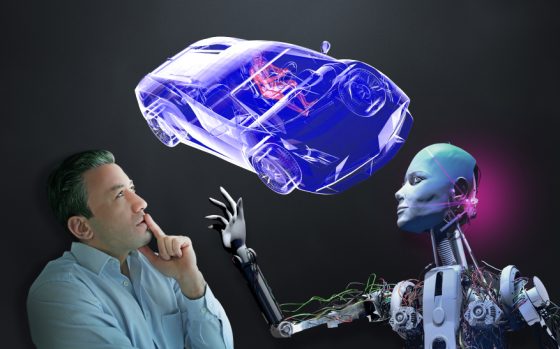In the future, you will have personal relationships with the brands that surround you. What does that mean exactly? It means the massive shift from outbound marketing to highly personalized inbound marketing will reach its logical conclusion: brands will become personalities (think of the endearing droids in Star Wars), who can consolidate all of the objectives of content marketing into a simple 1:1 interaction between the customer and the brand.
Hints Of What's To Come
George Wiedemann of UMarketing.com, in his keynote address at the Integrated Marketing Virtual conference, provided a vivid picture of this 1:1 relationship. He used the Autotrader.com app as an example — an app that has been raising eyebrows in both the tech and marketing worlds. A user, when car shopping, can type in the make and model of a desired car and the mile radius around where the user lives. The app then searches the entire inventory in that radius that matches the desired make and model.
But that's not all.
When the user drives to the dealership to see the car that she has found with her app, the app automatically locates precisely where the car is parked using beacons attached to the car and programmed to communicate exclusively with the app. As the user arrives, the app guides the user to the car, and once the user reaches the car, the app provides comprehensive information about the car that will help the user make a buying decision.
And then, if the user wants, she can enter another search (based on a mile radius) from her new location, and the app will show other similar cars so that the user can compare prices.
This app provides a remarkable purchasing experience, but it's just a glimpse of what's coming. Its use of apps and beacons is hardly tapping into the potential of technology. Robots equipped with rapidly developing A.I. technology will take the whole thing to a new level. We're already talking to our devices as if they were personalities (i.e. Siri for the iPhone, Alexa for Amazon Echo, the BMW's new smart car features, etc.). This relationship with brands will only grow in scope and complexity.
Wiedemann sums up where all of this is headed: “For me, where this ends up is that brands will use technology to have a personal relationship with me, including robots that will allow me to talk to the brand at the moments of truth in the customer journey. Exciting, isn’t it?”
What We're Really After: The Brain Of A Computer, The Personal Interaction Of A Human
In our current inbound marketing context, the top prize goes to brands that facilitate customized, relevant, and helpful interactions with customers on a 1:1 basis.
Robotics and artificial intelligence will revolutionize that process.
We build vastly complex strategies involving every stream of data and communication we can get our hands on — email, text, website browsing data, apps, smart device usage — and then we try to piece it all together and send bits and pieces of marketing content to leads through an array of voices. But we're moving down a road in which the chorus of voices will shrink into one voice: a robot that has the computer capacity to crunch Big Data about a customer in real-time while greeting that customer, who is standing in front of the robot in the company's lobby, by name, with a smile.
In a recent FoxNews Business article about integrated sales and marketing, the writer made this observation: “Today’s B2B buyers simply don’t need the assistance of a salesperson in the same way they did a decade ago. Instead, they rely on thought-leadership content, product reviews, case studies and peer recommendations that marketing teams develop to nurture prospects.”
Replace that last sentence with, “instead, they rely on robots,” and this article could be a message from the near future of marketing and sales.








